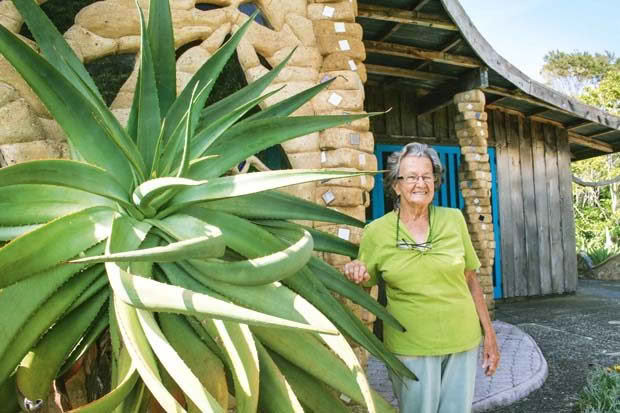Beware the posse of pillaging pigs
The idea of a gift economy works well in a weekend café but is not so welcome when garden pests help themselves
Issue #54 March/April 2014
Ask anyone in this neighbourhood to name their inspiration for growing old and the inevitable answer is Dhaj. Mentor to many, artist, builder, tech-savvy great-grandmother and athletic octogenarian, Dhaj is one of life’s expansive “yes” people, the sort who embraces change as a harbinger of possibilities and adventure. So after a friend asked Dhaj if she’d like to go backpacking through Turkey last year, it was no surprise to find the 84-year-old busily plotting an itinerary.
Before she departed, a group of us proposed opening a sort of café-gallery-workshop space in her house. Upon her return, she arranged for a digger to scrape off a sizeable car park. “Let the crowds come,” she told us. The house in question is something of a Far North institution. New Zealand’s first in situ mud-brick house, it sits like a giant sculpture on a knoll, composed of flowing lines, softly moulded walls, twisted columns and mosaic courtyards. Adding to its extra ordinariness is the fact that more than half of the thousands of bricks were placed in position by Dhaj herself when, aged 64, she hankered to live in an earthen home and teamed up with an expert to build one.

Dhaj and her organic mud-brick house.
We opened the Earth House to the public last Labour Weekend and have been operating every weekend since, serving meals and showcasing local talent. In true rumpty Far North style, the plates don’t match, the cutlery’s been scrummaged from kitchen drawers, the chairs and tables are scavenged and when we run out of glasses we’re forced to serve smoothies in mugs, but no one seems to mind. Some first-time diners are a little nonplussed to discover that our food has no price tags, but once we explain that the routine is to eat what they want then pay what they feel is appropriate, they quickly relax. Very occasionally someone exceptionally mean will drop a coin into our money box after polishing off a hearty lunch but, for the most part, our gift economy reinforces the belief that people are sincere and decent in their dealings.
Because we’re not actually selling our food, those of us involved with the project feel a certain removal of pressure and expectation. We want to please our guests, of course, but we’re more interested in serving up home-grown, predominantly organic meals rather than attempting to itemize ingredients, and it’s been liberating to leave the food’s value to public discretion.
Sadly, James’ and my pleasure in sharing garden produce dries up abruptly when we arrive home and discover we’re unwilling caterers to an entirely different sort of visitor. Alongside the regular bevy of bugs, wild thieving pheasants and marauding possums, lately we’ve been troubled by a posse of pillaging pigs. They come in the night, oinking and squealing as they descend from the forest to rootle the orchard and rifle the compost.
Pig hunting is a passion for many around here and when word of our wild porcines got out a local soon arrived to ask for a hunt. Assuring us his dogs had been trained to avoid kiwi, he opened the boot of his tiny car and summoned forth his pack of hounds like a magician pulling rabbits from a hat. However, although he’s carried a few dripping carcasses back to his car, the night-time gruntings from the fruit trees tell us that the pig chapter isn’t closed yet.
We learned of another unwelcome guest’s existence one summer night when James leapt from the bed, yanking back the sheet as he simultaneously clutched at his buttocks. While the giant centipede writhing angrily on the mattress wasn’t quite of anaconda proportions, it was longer than my hand and seemed more snake than beetle as James attempted to capture it. Even though he assured me it was released miles from the house, it was months before I stopped thrashing the bed sheets about in sudden alarm as I imagined it gently tickling my legs.
In the next post, Polly, James and Vita foolishly fall for a puppy and a professional possum trapper sets to work on their land.
 This article first appeared in NZ Life & Leisure Magazine.
This article first appeared in NZ Life & Leisure Magazine.
